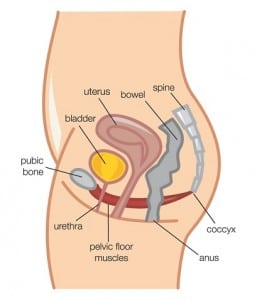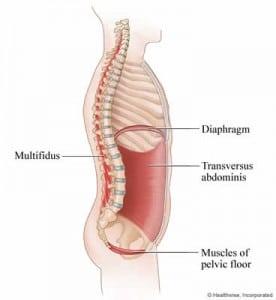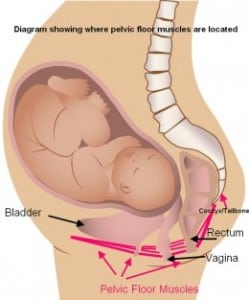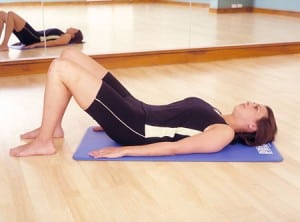How simple pelvic floor exercises are helping new mums get back to an active life with confidence
Have you recently had a baby but are struggling to be active without leaking urine? Perhaps you are dependent on wearing a pad ‘just in case’?
Whether you have set your sights on running a 5K race or just need to be able to run around after your toddler – you need a good strong pelvic floor!
Read on to uncover the mysteries of your pelvic floor and why it is so important. Find out how we can help.
The pelvic floor – what is it?

imaged sourced from www.continence.org.au
The pelvic floor is a sling of muscles between your pubic bone at the front and your coccyx at the back. It supports your bladder, bowel and pelvic organs. When working well it allows you to laugh, run, cough and sneeze without leaking and to enjoy a healthy, normal sex life!
Your pelvic floor muscles form part of what we call your ‘core’.
Your ‘core’

sourced from www.legacytherapystl.co.uk
If you imagine your trunk as a cylinder containing all your abdominal organs, your ‘core’ are the muscles that make up the walls of the cylinder.
The main core muscles are your diaphragm at the top, a deep layer of abdominal muscle at the front, a deep layer of lower back muscles at the back and finally the all important pelvic floor muscles supporting the bottom of the cylinder.
What happens during pregnancy and birth?

sourced from www.doctoranddaughter.co.uk
During pregnancy your pelvic floor muscles are under much more strain from the weight of the growing baby and it’s surrounding fluid. This can weaken the muscles.
During childbirth the muscles are stretched further and are sometimes torn or the midwife may perform an episiotomy (a small cut to help the baby’s head arrive).
After the birth the muscles’ ability to respond to the demands of daily life are greatly reduced. The muscles can be bruised and sore or even feel a bit numb.
What is Stress Incontinence?
Leaking urine when you cough, sneeze, laugh or move is called stress incontinence. It’s very common but it’s really important to resolve the problem and, if left alone, is likely to worsen with subsequent pregnancies.
If you don’t address the issue it can lead to prolapse or other complications in later life – plus of course you simply can’t lead a normal life!
The muscles are also important stabilisers of your back and weak pelvic floor and abdominal muscles after childbirth can leave your back susceptible to injury and pain.
How can Physiotherapy help?
Fiona Buchanan, our Women’s Health Physiotherapist, has particular training and expertise which allows her to assess and treat pelvic floor problems.
She is also trained in Pilates which is a form of exercise that is brilliant for improving your core muscles.
What to expect from your appointment
Firstly Fiona will ask you lots of questions about how the problem is affecting you. She will also assess how strong your muscles are.
Rest assured that Fiona is a highly professional Physiotherapist and your privacy will be paramount.
What does treatment usually involve?

sourced from www.pregnancycyclue.com
Treatment usually involves a home exercise programme tailored to your specific needs.
Sometimes Fiona will use some soft tissue release techniques and scar tissue massage to help relieve pelvic floor pain.
If you would like to book an appointment to see Fiona then simply call the clinic on 020 8876 5690 or click here to contact us by email.
Fiona is always happy to chat things through over the phone first if you are unsure about anything.
If you have enjoyed this blog do take a look at our other related blogs by clicking here.


